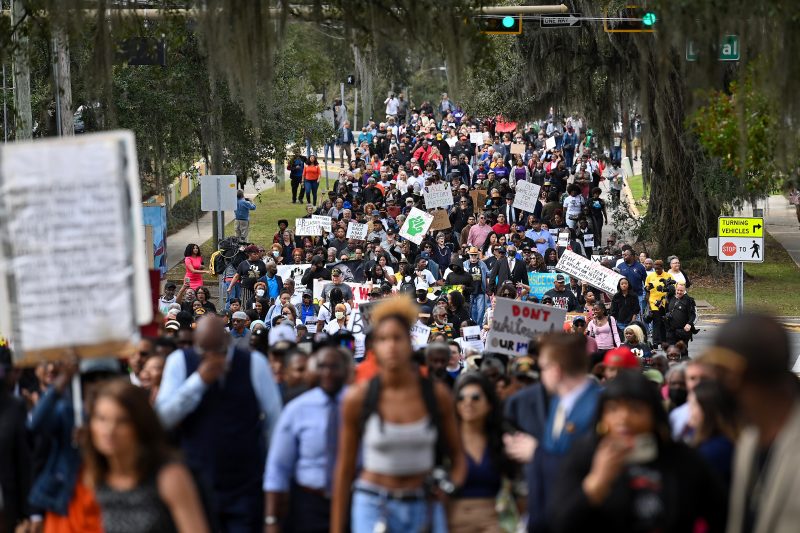Over the past year, conservative policies touching on education, immigration and LGBTQ+ rights in Florida have led some advocacy groups and organizations to recommend that visitors reconsider their travels to the state.
On Saturday, the NAACP became the latest to issue a travel advisory to the Sunshine State, warning that Republican Gov. Ron DeSantis’s “aggressive attempts to erase Black history and to restrict diversity, equity, and inclusion programs in Florida schools” have turned the state into an “openly hostile” place for people of color and members of the LGBTQ+ community.
“Before traveling to Florida, please understand that the state of Florida devalues and marginalizes the contributions of, and the challenges faced by African Americans and other communities of color,” the NAACP advisory reads.
A spokesperson for DeSantis did not immediately respond to a request for comment. Responding to the NAACP warning on Saturday, the governor’s press secretary, Jeremy Redfern, tweeted a GIF of DeSantis saying: “This is a stunt. If you want to waste your time on a stunt, that’s fine. But I’m not wasting my time on your stunts. Okay?”
https://t.co/utIiJtFAEP pic.twitter.com/tOmszroAc9
— Jeremy Redfern (@JeremyRedfernFL) May 20, 2023
The NAACP’s advisory comes four months after Florida rejected the College Board’s new Advanced Placement course in African American studies — a part of DeSantis’s long-running war on what he calls “woke ideology” infiltrating schools. Since 2021, DeSantis has urged restrictions on how Black history is taught. Last year, he signed a law banning critical race theory in public schools. (Critical race theory is an academic framework focused on the idea that racial inequality is systemically interwoven in American society, legal systems and institutions.)
NAACP President and chief executive Derrick Johnson framed those policies as an act of erasure.
“Failing to teach an accurate representation of the horrors and inequalities that Black Americans have faced and continue to face is a disservice to students and a dereliction of duty to all,” Johnson said in a news release.
Those painful chapters in Florida history are what historian Marvin Dunn has dedicated his life to documenting and sharing. Since January, the 82-year-old Florida International University professor emeritus has taken a defiant stance against DeSantis with his “Teach the Truth” tours, through which he takes high school students to sites of racial violence in Florida.
“If people don’t know what mistakes took place in the past, there’s a great chance that they will be repeated in the future,” Dunn said. “And that’s why we need to know about these things: to avoid them being brought upon us again.”
Dunn remembers the Jim Crow era, during which he and his mom walked, hands anxiously squeezing, to the back of the bus or stayed silent as White people passed them in the queues. And though those overtly discriminatory policies are a remnant of the past, Florida’s new laws and rhetoric under DeSantis have left Dunn feeling “like I’m not welcome in my own home state,” he said.
“It’s not in the sense of a physical threat,” Dunn said. “It’s in the sense that I’m not appreciated because my history and, therefore, my personhood, doesn’t count.”
The NAACP’s travel advisory was welcomed by Dunn, who said he hopes it will discourage visitors and result in a measurable economic impact because tourism is one of Florida’s greatest income sources. Last year, the state reported a record tourism year, with an estimated 137.6 million visitors. In 2021, visitors contributed $101.9 billion to Florida’s economy and supported over 1.7 million jobs, according to Visit Florida, the state’s official tourism marketing body.
Yet other Black residents, like Luther “Luke” Campbell, a Miami-based rapper and community activist, criticized the advisory as “too little, too late.”
“An advisory is really weak,” Campbell said. “I mean, don’t soften the blow. If you’re going to really do something, just go in and say it’s a full-on boycott. That would be more effective than an advisory because you have to put real pressure on these people.”
Though Campbell acknowledged a boycott could hurt minority-owned and small businesses, he said it’s the only way to bring change. “Yes, it will hurt all of us,” he said, “but we all need to feel that pain.”
“We need people to be calling their state legislators and say, ‘You’re affecting my bottom line,’” Campbell added. “There needs to be calls from the people who vote for them and put money in their campaigns. If those [voters] feel that pressure, they won’t keep thinking it’s real cute for these politicians to pass bills attacking African Americans.”
It’s still unclear what effects the new Florida policies — and the advisories they’ve prompted — will have on the state’s economy. But in recent months, the DeSantis-backed Parental Rights in Education Act, dubbed the “don’t say gay” bill by critics, sparked a bitter battle with Disney, a major player in Florida’s economy.
This month, DeSantis signed into law a sweeping immigration bill requiring some employers to verify their workers’ citizenship, compelling health providers to ask about their patients’ immigration status and establishing harsher penalties for transporting undocumented people. That prompted the League of United Latin American Citizens to issue a travel advisory on Wednesday, warning Latino visitors to remain cautious if they encounter law enforcement.
“We do not doubt that if Abuelita or Tia is with us and we are profiled, DeSantis’ enforcement regulations will treat us like criminals, transporting a dangerous person who only wanted to visit family or enjoy Disneyworld,” LULAC President Domingo Garcia said in a news release.
Despite the national attention on Florida, Dunn said, the “problematic news is just a detour from what Florida truly is. We have some really good people here, too.”
“It’s like when somebody criticizes your mama: You know she’s not perfect, but don’t come knocking on my mama. I’ll knock her myself.”
